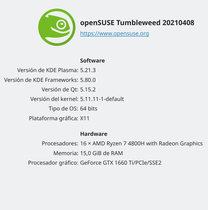I recently build a brand new mail server with Leap 15.2
I installed sendmail as MTA and enabled remote connections on port 25 using Yast and also checking that /etc/sysconfig/mail has the value:
SMTPD_LISTEN_REMOTE="yes"
and restarted sendmail.
sendmail accepts connections on port 25 for the localhost but refuses it from the external interface. I have firewall and apparmor disabled (yes I do not need them, I have an enterprise class firewall).
This works instead on a 15.1 server and on a 15.1 server that has been upgraded to 15.2.
This is the nmap output on the local interface:
# nmap -sS -O 127.0.0.1
Starting Nmap 7.70 (
https://nmap.org ) at 2021-04-14 19:58 EDT
Nmap scan report for localhost (127.0.0.1)
Host is up (0.0000040s latency).
Not shown: 991 closed ports
PORT STATE SERVICE
22/tcp open ssh
25/tcp open smtp
53/tcp open domain
80/tcp open http
119/tcp open nntp
139/tcp open netbios-ssn
443/tcp open https
445/tcp open microsoft-ds
873/tcp open rsync
Device type: general purpose
Running: Linux 2.6.X
OS CPE: cpe:/o:linux:linux_kernel:2.6.32
OS details: Linux 2.6.32
Network Distance: 0 hops
This on the external interface:
# nmap -sS -O 192.168.0.4
Starting Nmap 7.70 (
https://nmap.org ) at 2021-04-14 19:56 EDT
Nmap scan report for smoke (192.168.0.4)
Host is up (0.000049s latency).
Not shown: 992 closed ports
PORT STATE SERVICE
22/tcp open ssh
53/tcp open domain
80/tcp filtered http
119/tcp open nntp
139/tcp open netbios-ssn
443/tcp filtered https
445/tcp open microsoft-ds
873/tcp open rsync
Device type: general purpose
Running: Linux 2.6.X
OS CPE: cpe:/o:linux:linux_kernel:2.6.32
OS details: Linux 2.6.32
Network Distance: 0 hops
Has anyone experienced this issue and is there a way to enable remote smtp conncetions?
